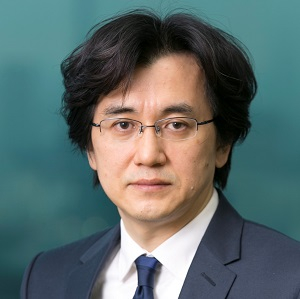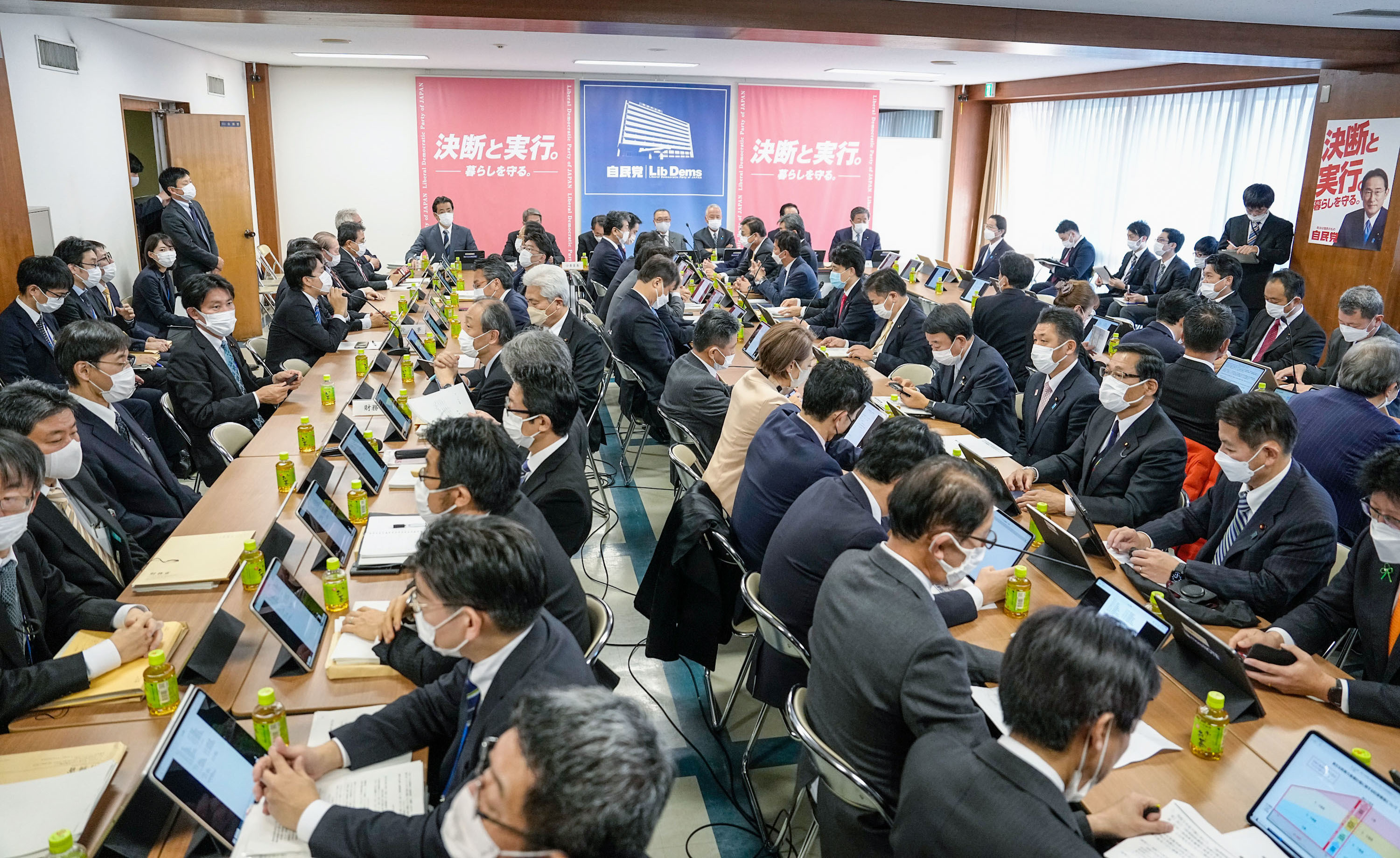- Article
- Political Institutions
Hereditary Lawmakers in an Era of Politically Led Policymaking (1)
May 29, 2009
Whether to restrict the handing down of Diet seats from generation to generation of the same family is likely to be a major issue in Japan’s next general election. Here the author will outline the prominence of “hereditary politicians” and examine their policymaking ability.
The Prominence of Hereditary Lawmakers
The prevalence in the Diet, and especially in the ruling Liberal Democratic Party, of second- and third-generation politicians who inherited their sanban [1] (three key factors for being elected—namely, campaign organization, name recognition, and fundraising apparatus) from a parent or grandparent is under close scrutiny as one of the problems afflicting modern Japanese politics. This issue was previously taken up in the 1970s by the media and some scholars; the main reasons for its reemergence are as follows.
- 11 of the 17 cabinet ministers in the current administration of Prime Minister Taro Aso (after the dismissal of Minister of Land, Infrastructure, Transport, and Tourism Nariaki Nakayama and the resignation of Minister of Finance Shoichi Nakagawa) are hereditary politicians, and two of the remaining six are children of former local politicians.
- Most of Japan’s recent prime ministers have been hereditary politicians, including six of the seven since Ryutaro Hashimoto took the post in 1996. Both the father and grandfather of the only exception, Yoshiro Mori, were former mayors.
- Japan’s last three prime ministers—Shintaro Abe, Yasuo Fukuda, and Taro Aso—are all hereditary politicians descended from former prime ministers. The way in which Abe and Fukuda suddenly resigned, appearing to abandon their respective administrations when the going got tough, has further tainted the image of hereditary politicians.
- Former Prime Minister Junichiro Koizumi, who fiercely criticized the dynastic practices of special postmasters (a powerful lobbying group that opposed his privatization of postal services) and the old-style elements in the LDP, has nominated his own son, Shinjiro, to stand for his Diet seat when he retires at the next election.
Definitions of what constitutes a hereditary politician vary, and I will not go into the details of that debate here. Suffice it to say, although the precise figures differ somewhat depending on which definition is used, something like 40% of current LDP Diet members fall into this category, and this is in fact a marked decrease on the figure prior to the 2005 House of Representatives election, when the election of numerous “Koizumi children” [2] swelled the ranks of nonhereditary lawmakers. The proportion is even higher among those holding senior positions in the LDP or the government. Although the proportion of hereditary politicians in the main opposition party, the Democratic Party of Japan, is much lower than that in the LDP, standing at around 20%, both the party’s current president, Yukio Hatoyama, and his predecessor, Ichiro Ozawa, are hereditary lawmakers (although Hatoyama would be excluded by some definitions of the term, because he did not inherit his father’s seat, or “terrain”).
I would also like to highlight two interesting facts with relevance to the debate over dynastic politics.
- The Tokyo bloc of seats allocated by proportional representation has produced by far the lowest proportion of hereditary lawmakers in the past several House of Representatives elections, and while there are some regional disparities, rural areas generally have higher proportions of such politicians than urban areas. At the same time, Japan has not had a prime minister from Tokyo, the country’s largest concentration of voters, since Ichiro Hatoyama in the mid-1950s.
- Hereditary candidates have an exceptionally high win ratio of some 70% to 80% in the past few lower house elections. This is much higher than the figure among other candidates. Even rookie hereditary candidates won 59% of the seats for which they stood at the 2005 election, a percentage more than 20 points higher than that for nonhereditary candidates.
Aside from the general prevalence of hereditary politicians, what stands out among recent trends is the high proportion of key government and LDP posts that they occupy. Second- and third-generation politicians are disproportionately represented among not only cabinet ministers but also the LDP’s three top executives. Yet of the 21 prime ministers who served between the coming into effect of the current Constitution in May 1947 and the resignation of Prime Minister Tomiichi Murayama in January 1996, just three were hereditary politicians (Ichiro Hatoyama, Kiichi Miyazawa, and Tsutomu Hata).
The biggest reason for the unusually high proportion of hereditary politicians in senior government and LDP posts is the practice of allocating executive positions on the basis of the number of terms lawmakers have served, which was institutionalized within the LDP in the 1970s. [3] The result was that hereditary lawmakers, who tend to enter politics and accumulate terms while still young, were appointed to senior posts at relatively young ages, enabling them to raise their status within the party and to increase their name recognition among the public. This also gives them the advantage of being able to stress their youth when they become candidates for a cabinet post or the premiership. It is very difficult, meanwhile, for nonhereditary candidates to muster the “ sanban ” (campaign organization, name recognition, and fundraising apparatus) in their twenties or thirties and win a seat under the multiple-seat constituency system.
Dynastic politics can be analyzed and criticized from a variety of angles. For the moment, let us just say that the phenomenon clearly presents problems. High incidences of second- and third-generation personnel from the same families may be nothing unusual among unlisted private companies and in traditional arts. By rights, however, high rates of heredity should be rare among organizations of a public nature, such as listed companies and government institutions, let alone in the population from which is drawn the core of two of Japan’s three branches of government (the legislature and the executive). [4] Comparisons with other advanced democracies also show that Japan, and in particular the LDP, has a conspicuously high ratio of hereditary politicians. While such politicians exist to some extent in every country, only in Italy is their prevalence close to that seen in Japan (and even there the proportion of hereditary politicians is lower than in Japan). In the United States, for example, hereditary politicians make up only around 5% of all lawmakers.
The current situation is not healthy for Japanese society. Economic disparities have become a major social issue in recent years, and yet at the core of the legislative and executive branches of government, whose responsibility it is to produce policies to address these disparities, lies the very epitome of inequity—a world whose class divisions are fixed in place through blood ties.
Hereditary Politicians and Vested Interests
Since hereditary politicians inherit their supporters’ associations from previous generations of their families, it is reasonable to assume that they are constrained by the same shackles and vested interests as existed in the time of their parents, grandparents, or even great-grandparents and that, therefore, they are liable to favor those vested interests in formulating their policies. It is not unusual for young hereditary lawmakers to reveal in private that they followed their parent or grandparent into politics not of their own volition but out of a sense of duty. Many feel they cannot refuse to take over their parent’s Diet seat out of consideration for the people who supported their parents down the years. Especially in provincial regions, the supporters’ associations of ruling party politicians have ties with a range of special interests, linking the destiny of many supporters inextricably to that of the lawmaker they support.
On the other hand, some might argue that first-generation Diet members who enter national politics after serving, for example, in a prefectural assembly in a provincial region, are more susceptible to influence from local interests because they have to build their own supporters’ associations and fundraising groups from scratch. Another possible view is that hereditary politicians’ higher chances of winning elections relative to other candidates make them less likely to be swayed by the interests of their electoral districts.
As a real-life example of hereditary politicians’ behavior, let us look at the July 2005 Diet votes on postal privatization, [5] which caused a rare split among ruling party members. Of the LDP rebels who either voted against the postal privatization bills, abstained, or were absent for the votes, 41.8% were hereditary lawmakers, which is not significantly different from their overall representation in the LDP ranks. Breaking down the figures, however, reveals some more interesting nuggets of data. Hereditary lawmakers accounted for just 32.4% of LDP Diet members who voted against the bills but a remarkable 64.3% of abstainers and absentees.
The many abstentions and absences can be seen as means for hereditary Diet members to balance their loyalty to the LDP—the party of their parents and grandparents—with the interests of the local voters who have supported their family’s candidates down the generations. In the eyes of the public, though, these non-votes reinforce the impression that hereditary politicians are weak and indecisive, characteristics for which they have been widely criticized. One cannot, of course, assert definitively that those LDP politicians who opposed the postal privatization bills or abstained must have had strong links with local interests. Nevertheless, this data is interesting.
The Policymaking Prowess of Hereditary Politicians
Looking purely at their policymaking abilities, does the unusually high prevalence of hereditary politicians pose any problems? This issue has a significance that transcends emotional reactions, particularly given the vocal calls to swap the current, bureaucrat-led policymaking system for a system in which politicians are in charge.
A quick glance at the roster of LDP Diet members does not suggest that hereditary lawmakers lack policymaking ability. On the contrary, they constitute a sizable portion of the lawmakers known as “policy experts.” This finding cannot be taken at face value, however.
People with a talent for policymaking can choose from a variety of attractive occupations other than politics. When these people consider the option of a career in politics, they calculate their expectations by multiplying the anticipated rewards by the likelihood of their actually becoming a lawmaker (probability of winning election, etc.). Needless to say, scions of political families have a much greater chance of winning Diet seats than ordinary people with no family connections, so prospective hereditary politicians have higher expectations for politics as a career option. For everyone else, by contrast, the low probability of winning a Diet seat equates to low expectations for a career in politics, and this harsh reality prompts those with genuine talent to pursue one of the many other career options open to them.
In other words, there is little likelihood that a talented young person who has received attractive job offers from various companies would willingly pass up those promising options to try to win a Diet seat in a district where he or she would be running against a very strong candidate and have scant prospect of victory (assuming he or she even managed to get on the ballot in the first place). If, on the other hand, that same young person had access to a district in which his or her father or grandfather had built up a political base and where election victory was virtually guaranteed, he or she might well opt to pursue a political career. [6]
As long as ordinary citizens continue to have less chance of winning election to public office than political heirs apparent, talented, in-demand people will be increasingly inclined to reject the option of a career in politics. The process of securing the official endorsement of a powerful political party constitutes a further major hurdle for nonhereditary candidates. Thus, compared to prospective political heirs, ordinary citizens are saddled with major disadvantages not only in their chances of election but even in their chances for candidacy (that is, for winning a major party’s endorsement). The upshot of this is that, with the exception of bureaucrats, local politicians, and others with special access to the field, the only members of the general public apt to run for the Diet are those who have no other promising career options and simply want to try their luck. By preventing talented nonhereditary politicians from entering the Diet, the very existence of hereditary politicians has the effect of ensuring their relative policymaking superiority.
An Analogy with Hereditary CEOs
It is difficult to measure lawmakers’ policymaking ability objectively. There does exist, however, detailed empirical research—albeit in a different field—on the performance of companies controlled by hereditary presidents. This research shows that companies led by hereditary presidents perform worse and spend less on research and development than other businesses in the same industry. [7] According to research conducted by Professor Francisco Pérez-González of Stanford Graduate School of Business, when a descendant of the founder of a listed company is chosen as the CEO, the company’s share price falls by 1%, whereas the appointment of an outsider causes a 2% rise. [8] The appointment of a hereditary CEO also tends to be followed by a substantial deterioration in return on equity (ROE) and other management indicators. As Professor Pérez-González notes, the appointment of company presidents and other personnel on the basis of familial connections compromises companies’ performance by undermining healthy competition in the labor market.
In recent years Japan has witnessed a series of scandals involving the falsification of production and use-by dates by food manufacturers. These incidents have often been blamed on “free-market excess” or “overcompetition,” but the list of companies involved reveals that most—including Fujiya, Kitcho, Ishiya (maker of Shiroi Koibito cookies), and Akafuku—have a long history of management by members of the same family. Previous product-safety scandals have also involved family-run firms, such as Snow Brand Milk Products, Nippon Meat Packers, and (outside the food industry) Paloma. The falsification of product-safety data by such companies is not a recent phenomenon.
While hereditary CEOs’ management ability (or lack thereof) is one reason why so many of these scandals occurred at family-run companies, a bigger factor may be that keeping the management of a company “in the family” undermines corporate governance. In other words, far from being the result of too much competition, these incidents occurred because restrictions on competition and personnel mobility within the companies prevented talented managers from being appointed to senior positions, blocking the mutual oversight that could have averted such malfeasance. Hereditary lawmakers who inherit their parents’ and grandparents’ campaign associations and fundraising apparatus must take great care not to replicate this phenomenon in the world of politics.
Achieving Pluralistic Values
As representatives of all the Japanese people, Diet members are expected, through the democratic process, to bring pluralistic values to the task of policymaking. As studies of normative criteria by Robert Dahl and other political scientists have shown, pluralism has value in and of itself in a democratic state. It can be mathematically demonstrated that, under certain conditions, when a group of people who share the same values and judgmental frameworks admits people with different values and judgmental frameworks, the judgment of the group as a whole improves.
The extraordinarily high proportion of hereditary politicians in the Diet is a serious problem in terms of ensuring pluralism in the formulation of public policy through the democratic process. Because any newcomer’s ability to win a Diet seat is hampered by three major needs—campaign organization, name recognition, and fundraising apparatus—people of different backgrounds have limited access to the Diet. As has been noted elsewhere, this lack of diversity is reinforced by the fact that hereditary politicians tend to be raised in similar economic and household environments and attend the same universities. [9]
The voting rights guaranteed by Japan’s Constitution include not only the right to choose a candidate but also the right to be chosen. To put it bluntly, no guarantee of the right to vote—however cast-iron—can produce democracy, let alone pluralism, if there is only one (recognized) candidate. If the three aforesaid needs are blocking the flow of pluralistic values into the democratic process in Japan, then Japan’s democracy may be in serious trouble.
[1] The term sanban (“the three ban ”) refers to the jiban (literally “terrain”), kanban (“billboard”), and kaban (“briefcase”) passed from generation to generation of the same political family.—Ed.
[2] The “Koizumi children” are rookie LDP politicians who were elected to the Diet for the first time in the September 2005 House of Representatives election. The nickname derives from the fact that their election was made possible largely due to Koizumi’s popularity at the time and that they were staunch supporters of his reform drive.—Ed.
[3] The institutionalization of the practice at this time may, in some ways, be related to the “ceiling” system of setting limits on government expenditure in each area before the budget is compiled. This in itself is an interesting subject for research.
[4] The incidence of heredity in the remaining branch, the judiciary, is extremely low. It is rare for lawyers, let alone Supreme Court judges or public prosecutors, to be succeeded by their children or grandchildren. This is because the difficult and highly competitive bar examination has served to prevent hereditary practices and to continually inject new blood into the judicial system. In the medical profession, by contrast, where the key qualification—the national examination for medical practitioners—has a high pass rate, the incidence of heredity among private medical practitioners is high. Following recent reforms to the judicial system, the pass rate for the bar examination has risen dramatically, and it is possible that this may increase hereditary tendencies among lawyers and other legal professionals.
[5] The bills relating to the privatization of Japan’s postal services were submitted to the ordinary session of the Diet in 2005 as the centerpiece of then Prime Minister Koizumi’s reform program. After some revisions, they were passed by the lower house, the House of Representatives, on July 5 by a margin of just five votes but were rejected by the upper house, the House of Councillors, on August 8. Despite strict instructions from the LDP’s executive to toe the party line, many LDP members in both houses voted against the bills.—Ed.
[6] This is a highly simplified example. The extent to which any politician considers his or her profession rewarding varies greatly depending on the individual, and it is possible that intensified competition among candidates who are not heirs to Diet seats would also produce more capable politicians. In any case, though, creating a level playing field would surely yield more capable candidates.
[7] See, for instance, Morck, R. K. (ed.). 2000. Concentrated Capital Ownership . Chicago: University of Chicago Press.
[8] See, for instance, Morck, R. K. (ed.). 2000. Concentrated Capital Ownership . Chicago: University of Chicago Press.
[9] To cite a simple example, Prime Minister Taro Aso’s current cabinet includes more graduates of Keio University (six) than of any other university; all six are hereditary politicians.




